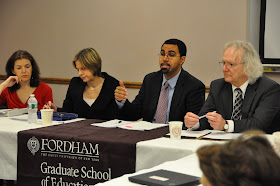
By James J. Kempster
Soon after the groundbreaking ceremony for the new Fordham Law building last May, I went for a tour of the half-century-old current building on the Lincoln Center campus.
I was struck by the number of state-of-the-art services that have been squeezed into the tight, insufficient structure. It is not a comfortable fit. Equipment sticks out into halls. Floor plans meander like mazes and students congregate in lounge areas barely bigger than the elevators.
Glimpsing some of the original fixtures and molding, I easily imagined a time when the rooms housed only desks and chalkboards, when
Mad Men-era faculty members and priests maneuvered the halls with the streamlined mid-20th-century polish of statesmen. However, the structure has clearly become insufficient for their 21st-century successors, and we are grateful that the new building promises to support services never imagined in the 1960s.
I have had a similar feeling when I roam the virtual hallways of Fordham’s website. Time collapses in virtual years. As technology has advanced, the University’s website, though visually redesigned only a few years ago, has not been able to incorporate new features and content easily. As with the websites of many academic institutions, the Fordham site has devolved into a cobbled-together group of services filling the immediate needs of schools and departments, without a cohesive system or guiding plan to unify them, enhance the user experience, or support the greater mission and goals of the University.
Our capable but small web staff often must first attend to users’ immediate needs and frustrations, without the time or support to focus on larger issues that would not only curb these frustrations, but improve the website for a broader group of users now and going forward.
The result is a website overdue for reassessment and redesign. Many important features are necessary to make a good website, but the following are perhaps most important, currently:
• support for video, social media, calendaring and user-provided content;
• intuitive navigation and structure that are clear to the user;
• design that unifies the Fordham look and message, while supporting the vast needs of the University;
• readiness for mobile and other future technological advances;
• data integration that directs information internally to serve school office procedures, while shaping content outwardly to suit the interests of each visitor;
• sufficient staff to support ongoing maintenance and development; and
• a cultural shift that puts web communication first, recognizing that our website is our single most important marketing tool.
A core steering committee of administrators and faculty members has met and is committed to shepherding this new website project. With the full support of the administration, we have begun planning a comprehensive strategy, based on good research and analytics, an extensive survey of the community, and sound technical, marketing and communications tactics.
From the start, a thorough assessment of our current online services, infrastructure and needs is crucial. The process must involve representatives from the entire Fordham community, including students, faculty members, alumni, administrators, supporters and friends. This requires assistance.
The steering committee is reviewing proposals from several outside firms to lead the assessment of the Fordham website and our needs. The finished assessment will include a report on the current state of our website and a plan for designing and implementing a new one. We estimate that the full process will require 18 to 24 months, though we expect the company with whom we ultimately work to provide a clearer timeline as part of its assessment.
Throughout the process, we will continue to keep the Fordham community informed of our progress. Over the coming months, we will publish a series of reports and articles about the project in Inside Fordham and on the Fordham Notes blog. From time to time, we will invite community members to participate in the assessment or share their thoughts as we proceed. Your support will ensure that what we develop in the coming months and years will serve the Fordham community well into the future.
James J. Kempster is the senior director of marketing and communications at Fordham.
 Peter Vaughan, Ph.D., dean of the Graduate School of Social Service (GSS), will be honored on Thursday, Dec 1 with a National Association of Social Workers’ “Leader of the Profession” award, given a by the NASW’s New York chapter.
Peter Vaughan, Ph.D., dean of the Graduate School of Social Service (GSS), will be honored on Thursday, Dec 1 with a National Association of Social Workers’ “Leader of the Profession” award, given a by the NASW’s New York chapter.



